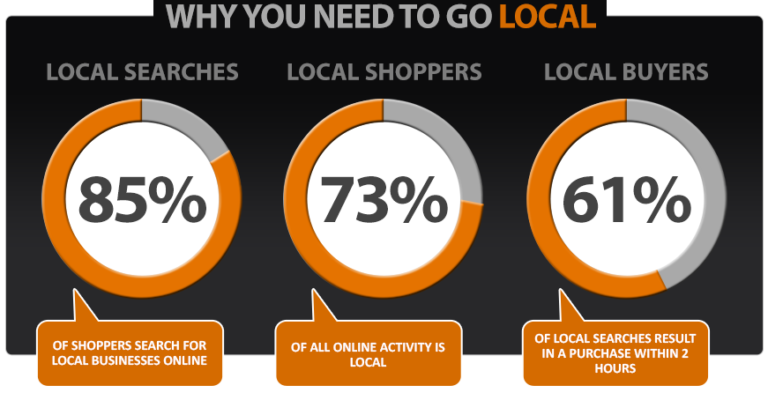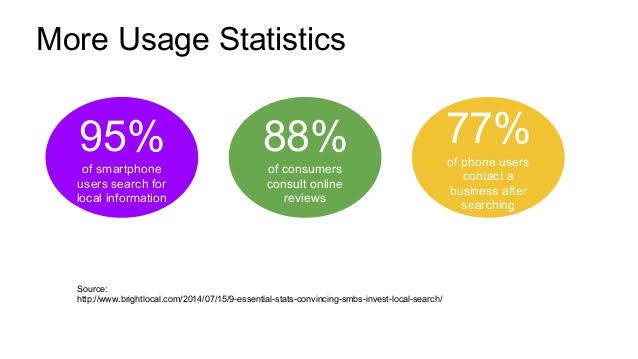Local SEO is the optimization of a local business’s website to rank high in the search engine result pages (SERPs), intending to target their local audience.
When we talk about a local audience, we refer to your potential customers within the same geographical location as your business.
Why is targeting such an audience crucial?
Well, 46% of all Google searches are done by people looking for local information.
How To Efficiently Use Local SEO To Increase Sales Revenue
There’s more:

As you can tell from the numbers, a local audience is a large pool of opportunity to boost your revenue.
To make the most of these opportunities, you need local SEO for your business. This will help you to get noticed, resulting in an increase in the volume of patronage for both your online and physical stores.
Every day, people conduct local searches looking for services and products nearby. And the majority of these people are ready to buy if they find what they are searching for.
Just like every other kind of SEO, businesses with the strongest local SEO practices will rank high, get displayed on SERPs’ first page, and have more revenue than businesses that don’t.
Data reveals that 72% of consumers that did a local search visited a store within five miles and local searches result in purchases 28% of the time.
If you haven’t learned how to use local SEO to your advantage, don’t worry. In this post, we will be giving you a few hints on how to efficiently use local SEO to increase your revenue.
Optimize your Google My Business (GMB) account
About 56% of local retailers have not claimed their Google My Business listing, and the success of your local SEO heavily hinges on claiming and verifying your local business on GMB.
Update vital contact information like the address of your business, the business hours, phone number or email, and the accepted mode of payment. This will make it easy for customers to contact you and get more information about your services.
Optimizing your Google My Business account makes it easy for your business to show in search results of Google Local Pack, Local Finder, and Google Maps. Google Maps is a powerful ally for your business because 86% of consumers use GoogleMaps to find a local business.
It is important to note that you are not the only one that can fill in your information on GMB. If you do not claim your listing and fill your contact information accurately, your competitor or someone else may claim and edit the listing, with misleading information that can drive your customers away.
Optimizing your Google My Business account makes it easy for your business to show in search results of Google Local Pack, Local Finder, and Google Maps. Click To TweetCreate Content Based on Local News and Events
Content plays a vital role in local SEO. However, it isn’t just enough to write content on general topics. You also need to create content based on local news and stories to attract the local audience.
The best way to increase your audience and your revenue with local content is to become a local authority in your niche. Be the first and the best at posting local industry news, recent trends, and other relevant information about the market.
Also mention hotspots or region-specific landmarks in your content. If any of these landmarks are close to your office, you can include them in the description of the address of your business.
While creating the content, ensure that you include relevant local keywords. This increases the chances of your content ranking high in search results pages. The local keywords can appear in the URLs, meta content, and copy of the website.
You can make use of Google Keyword Planner to filter keyword searches based on local searches within a location.
Optimize your Website for Mobile Screens and Voice Search
Predictions are that by 2021 mobile devices will be responsible for more than $1.4 trillion in local sales.
That’s not all:

Increasing your revenue through local SEO is a lot simpler if your website is optimized for mobile screens. This makes it easy for your customers to browse your website for contact information or for directions to your location while on the move.
According to Hubspot, local businesses with mobile-friendly sites have 61% more sales than those who don’t have one. Solely relying on a desktop website will restrict the number of target audiences your business will reach.
A major aspect of optimizing a website for mobile is ensuring that the website loads quickly. The load time should not exceed 3 seconds. If the website loads slowly, people will leave your site to that of your competitors. Also, ensure that images are optimized for mobiles and used sparingly.
You should optimize your website for voice search as well, as the use of voice search is rapidly increasing. Over 55% of consumers use voice search to find a local business, and 75% of these consumers conduct voice searches every week.
Optimizing for voice search enables you to cover how people ask questions when they speak into their devices instead of focusing on just how they type their search queries.
Knowing how people ask questions will enable you to write the SEO content to fit the target audience’s conversational tone.
The more specific your content is in answering your target audience’s questions, the higher your content will rank. This is because most searches are conducted when the target audience needs particular information or answers.
When optimizing your website for voice searches, try including the long-tail keywords that your target audience may use during voice searches.
Optimizing for voice search enables you to cover how people ask questions when they speak into their devices instead of focusing on just how they type their search queries. Click To TweetIdentify your Buyer Persona
Did you know that 93% of all companies that exceed their lead and revenue goals segment their database by buyer persona?
Research has proven that content based on a buyer persona increased customer engagement almost six-fold when targeting cold leads.
For your local SEO to be successful, you need to have a clear understanding of your ideal customers and what interests them. The buyer persona is often a semi-fictional description based on your potential customers’ behavior, challenges, lifestyle, demography, and motivation.
To develop your buyer persona, you need to first analyze the age, gender, and interest categories of your target audience.
Using tools such as Google Analytics, you will need to find out the goals your product meets for the target audience and get feedback from your sales and support team regarding what customers are most interested in.
You may need to interview the customers to know what they love or hate about your business and what areas need improvement.
Once the necessary information has been gathered, you can create generalized representations of your ideal customers (buyer persona).
The buyer persona should be a major consideration when making decisions, such as what are the right keywords to use and what SEO strategy best suits your target audience.
Conclusion
Remember that local SEO aims to attract your local target audience to your business. It should be a strategy that every business, especially those with physical locations, should embrace.
While focusing on your general SEO practices, ensure you do not neglect local SEO. If you haven’t started yet, you can start today by optimizing your Google My Business account.
While focusing on your general SEO practices, ensure you do not neglect local SEO. If you haven't started yet, you can start today by optimizing your Google My Business account. Click To TweetAre you currently practicing any of the local SEO tips examined in this post? Share your thoughts and tips in the comments below!
Ciao,
Miss Kemya
Jen McKenzie is an independent business consultant from New York. She writes extensively on business, education and human resource topics. When Jennifer is not at her desk working, you can usually find her hiking or taking a road trip with her two dogs. You can reach Jennifer @jenmcknzie.


